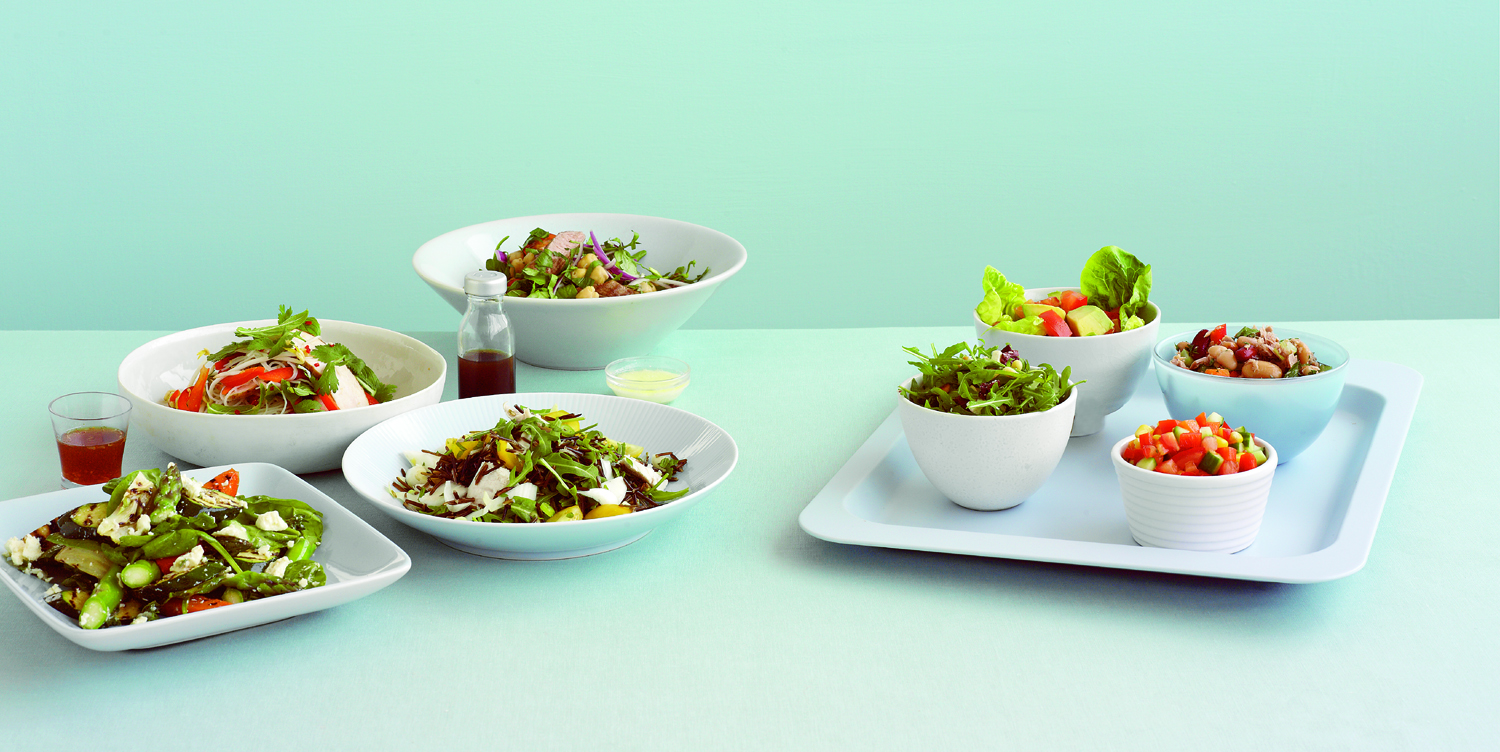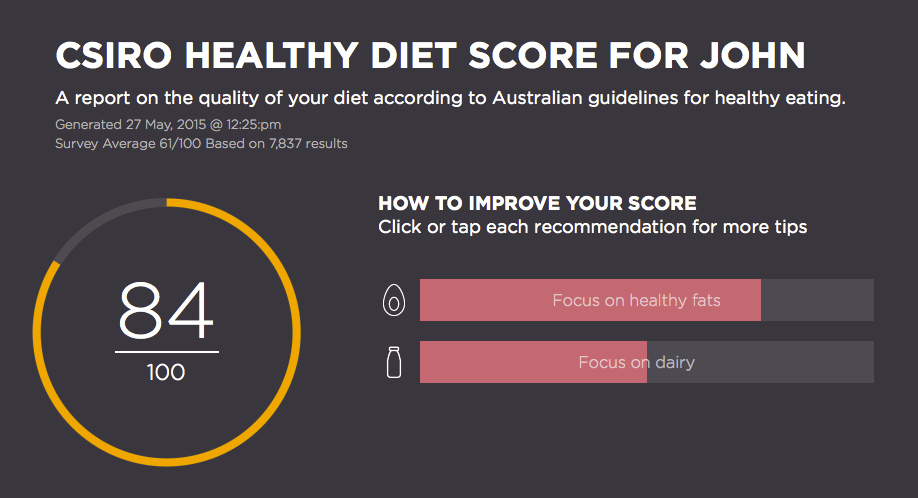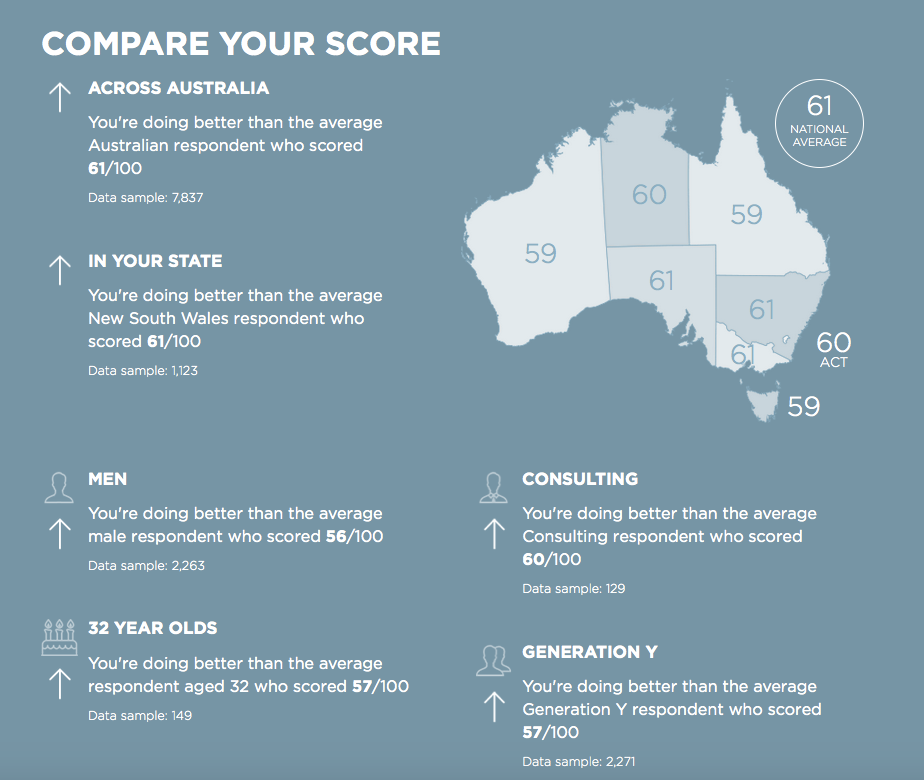 Do you you think you eat enough vegetables to shame a goat? Does your self-restraint when it comes to curly fries make you a smug dinner companion? Or are you an unabashed chocoholic, throwing caution to the wind when it comes to all things cocoa? We all feel varying amounts of guilt and pride about what we eat, but how often do we make an honest assessment of our diet and think about what we could do better?
Do you you think you eat enough vegetables to shame a goat? Does your self-restraint when it comes to curly fries make you a smug dinner companion? Or are you an unabashed chocoholic, throwing caution to the wind when it comes to all things cocoa? We all feel varying amounts of guilt and pride about what we eat, but how often do we make an honest assessment of our diet and think about what we could do better?
Well, now’s the time with our new online assessment tool that allows you to measure the quality of your eating habits. Introducing the Healthy Diet Score (HDS).
The HDS is a simple validated scoring system that we hope will help individual Australians measure the nutritional quality of what they eat. The score has been designed to measure whether a person is achieving the food recommendations from the Australian Dietary Guidelines for healthy eating.
Your score will be based on food variety, frequency, quantity and attributes like age and gender. You will receive a Diet Score between 1 and 100 and recommendations on how you can improve your diet.
The launch of the HDS follows more than three years of research by CSIRO and University of South Australia and is capable of providing a similar evaluation to other more complex diet assessment methods, such as weekly tracking of food intake
Research Director for Nutrition and Health and the co-author of the CSIRO Total Wellbeing Diet, Professor Manny Noakes, says that often most people overestimate how healthy their food intake is or may not be aware of what amounts of different foods are necessary for good nutrition.
“The online assessment aims to provide guidance on how to improve eating habits and to serve as a reminder that there is always room for improvement when it comes to making healthy food choices.
With most methods to assess eating habits being long and time consuming, we developed the Healthy Diet Score to provide an easy quick and reliable measurement for people to better understand the quality of their diet,” said Professor Noakes.
“A nutritious diet means eating a wide range of foods associated with a healthy lifestyle. However too often people will focus on a single food component or nutrient when looking to improve their diet. We know from previous research conducted that on average people are not eating enough vegetables, wholegrains and dairy foods and are eating too much junk food” said Professor Noakes.
You can watch Professor Noakes talking about the HDS on the Sunrise website.
We will aim to use the data collected from the HDS to help develop better ways to improve national eating habits and integrate it with other research into nutrition and dietary behaviour.
It only takes 10 minutes, so perhaps now’s the time to get your score?
*Thanks for all your questions and comments about the HDS on this blog and on other channels like Facebook. We’ve tried to answer every single one and have put together a few answers to the most frequently asked questions:
The quiz doesn’t include tea or coffee intake. Was I supposed to include tea in the amount of water I drink?
The calculation and feedback regarding “beverages” is based on the proportion of total beverage intake that is water. The more water you drink compared to soft drink, orange juice, cordial, and sports drinks, the higher your beverage score will be. This is based on the Australian Dietary Guideline (ADGS) recommendations of “drink plenty of water” and “avoid drinks containing added sugars”. For this reason we are looking to include “tea and coffee” specifically in the question about water consumption.
The survey does not include fats used in cooking / vitamin supplements / psyllium / other dietary variations. Will the results be accurate?
The HDS is a measure of compliance against the Australian Dietary Guidelines, which is based on whole foods. This is a short food survey designed as a quick reference tool to assess diet quality rather than a thorough dietary assessment. The compressed nature of this tool naturally has its limitations, however this particular survey has been validated to provide a good estimate of compliance with the guidelines.
Why doesn’t the survey include anything about ‘good fats’ like extra virgin olive oil?
Feedback from the Healthy Diet Score regarding “Healthy Fats and Oils” is based on meat trimming practices and the use of spreads containing unsaturated (healthier) fats. This is based on current scientific evidence that saturated fats increase the risk of heart disease. You are quite right however, that fats and oils used in cooking are not captured in the survey. Again, this is a limitation of having a short food survey designed as a quick reference tool to assess diet quality rather than a thorough dietary assessment.
Why doesn’t the HDS include adjustments for breastfeeding mothers?
We are looking at ways to integrate recommendations specifically for breastfeeding mothers in the questionnaire.
Why aren’t leafy green vegetables included as intake in the calcium question?
The Healthy Diet Score is a measure of compliance against the Australian Dietary Guidelines, which provide advice about the amounts and variety of foods needed to obtain enough nutrients essential for good health and reduce the risk of chronic health problems. It is informed by food modelling (whole diet approach) to find a suitable fit between nutrient requirements, energy intake and food combinations within different age and sex groupings.
While a range of foods provide calcium, dairy foods are still the main sources. Legumes, nuts and some green vegetables may contain some calcium but they do not provide sufficient amounts to meet calcium recommendations. It is possible to meet calcium requirements from non-dairy sources such as calcium enriched soy, almond, rice or coconut milk.
My recommendations include eating more dairy / gluten / nuts. What if I’m allergic or have an intolerance to these foods?
The recommendations at the end of the survey may NOT apply to people with medical conditions requiring specialised dietary advice.
How are the Healthy Diet Score recommendations going to help me lose weight?
The HDS is based on a comparison between your reported dietary intake and the Australian Dietary Guidelines from the Department of Health and Ageing. These guidelines provide advice about the amounts and variety of foods needed to obtain enough nutrients essential for good health and reduce the risk of chronic health problems. It is not designed as a weight loss diet,. However, individuals who habitually eat above the recommendations may experience weight loss by changing their diet to reflect the guidelines.




29th May 2015 at 2:12 am
Well I can’t get past question one as both browsers I tried didn’t work. I’ll go eat a hamburger instead.
29th May 2015 at 12:09 pm
Oh no! Apologies.
Did you log your problem on the Healthy Diet Score website? Can we follow up for you?
Carol
Social media team
28th May 2015 at 8:00 pm
Scored well but as I have survived perfectly well without dairy for 20 years you chose to penalise me…boooooo. Cows milk is for cows CSIRO. Plenty of healthier alternatives. When did you turn into a Dairy Australia shill?
28th May 2015 at 9:25 am
Quite a comprehensive test but I feel way too much emphasis on dairy. Cows milk is for cows, therefore not made for humans. In the western society there is research to suggest we have way too much dairy, which could possibly exacerbate, acne, allergies, breast cancer, weight gain, and digestive problems. I scored lower than I would have thought on this simply because I have hardly any dairy. There are many alternatives.
On the whole, in western society, we would be much healthier on more leafy greens, fruit, veggies and protein, and less sugar, carbs, processed foods and dairy.
Regular exercise helps too.
28th May 2015 at 6:04 pm
Raylene, why do you think you know more than the CSIRO?
29th May 2015 at 10:25 am
Shane, I don’t. I am merely reiterating the results of many, many recent studies by professionals that suggest in general that the western society consumes too much dairy.
David, below, seems to agree with me.
Here is just one of multitudes of articles:
http://www.healwithfood.org/acne/kitava-acne-free-diet.php
cheers.
4th June 2015 at 5:55 pm
As the HDS is based on ‘Australian Dietary Guidelines from the Department of Health and Ageing’ the real question is not to CSIRO but to the government.
Presumably the question is how much calcium are we get from our diet. In one of the questions we can answer with how much soy milk is consumed. Perhaps the suggestion to drink more milk relates to increasing calcium intake?
Regarding dairy free paleo-diets, while there may be many studies done by professionals that doesn’t mean that there is any consensus on cause or effect. The bloggers and paleo fans would have you think otherwise.
I think it will take a scientific revolution of sorts to establish that calcium is not required to prevent bone disease. If this happens, then perhaps the government will change recommendations about calcium/dairy intake.
4th June 2015 at 8:30 pm
Wait till you get old and have osteoporosis, might wish that you had more dairy in your life, and I don’t see any alternative that is as effective
27th May 2015 at 4:39 pm
Are there any OS/browser requirements to make this work?
28th May 2015 at 11:25 am
No, it should work on all standard systems.
27th May 2015 at 4:09 pm
Reblogged this on unischoolagrinetwork.